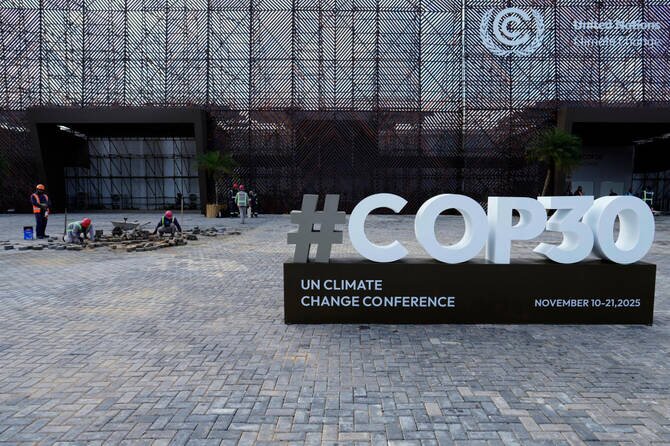
EU Climate Ministers in Last-Ditch Talks to Set New Target Ahead of COP30
European Union climate ministers convene for urgent discussions to establish a new climate goal, aiming to demonstrate leadership at the upcoming UN COP30 summit in Brazil.
In a bid to avoid entering the UN COP30 summit in Brazil without a concrete agreement on climate change, European Union (EU) climate ministers are set to engage in crucial talks on Tuesday.
The primary objective of these negotiations is to establish a new climate target that underscores the EU's commitment to combatting climate change amidst a complex global political landscape.
Failure to reach an agreement could undermine the EU's self-proclaimed leadership role at COP30, particularly in light of potential opposition from U.S. President Donald Trump and other major economies such as China, Britain, and Australia, which have already submitted new climate targets ahead of the summit.
The EU's challenge lies in balancing its ambitious CO2-cutting policies with concerns raised by various member states regarding economic impacts.
For instance, countries like Italy, Poland, and the Czech Republic have expressed apprehensions about the proposed target to cut net EU greenhouse gas emissions by 90% from 1990 levels by 2040, arguing that such stringent measures may pose a burden on industries already grappling with high energy costs, competition from cheaper imports, especially from China, and U.S. tariffs.
In contrast, nations like the Netherlands, Spain, and Sweden advocate for ambitious goals to address intensifying extreme weather conditions and to accelerate Europe's lead in developing green technologies, comparable to China's advancements in this field.
To achieve a consensus on Tuesday, EU ministers must agree on the allocation of carbon credits that will permit countries to partially offset their emissions.
The proposed new climate goal also includes provisions for flexibility, such as weakening the 2035 combustion engine ban under certain conditions, to address concerns raised by member states like France and Germany.
A vote requiring support from at least 15 of the 27 EU members is expected to be a closely contested affair, with several countries still undecided on their positions.
The ultimate goal is to establish an emissions pledge for 2035 that aligns with the UN's requirements ahead of COP30.
The primary objective of these negotiations is to establish a new climate target that underscores the EU's commitment to combatting climate change amidst a complex global political landscape.
Failure to reach an agreement could undermine the EU's self-proclaimed leadership role at COP30, particularly in light of potential opposition from U.S. President Donald Trump and other major economies such as China, Britain, and Australia, which have already submitted new climate targets ahead of the summit.
The EU's challenge lies in balancing its ambitious CO2-cutting policies with concerns raised by various member states regarding economic impacts.
For instance, countries like Italy, Poland, and the Czech Republic have expressed apprehensions about the proposed target to cut net EU greenhouse gas emissions by 90% from 1990 levels by 2040, arguing that such stringent measures may pose a burden on industries already grappling with high energy costs, competition from cheaper imports, especially from China, and U.S. tariffs.
In contrast, nations like the Netherlands, Spain, and Sweden advocate for ambitious goals to address intensifying extreme weather conditions and to accelerate Europe's lead in developing green technologies, comparable to China's advancements in this field.
To achieve a consensus on Tuesday, EU ministers must agree on the allocation of carbon credits that will permit countries to partially offset their emissions.
The proposed new climate goal also includes provisions for flexibility, such as weakening the 2035 combustion engine ban under certain conditions, to address concerns raised by member states like France and Germany.
A vote requiring support from at least 15 of the 27 EU members is expected to be a closely contested affair, with several countries still undecided on their positions.
The ultimate goal is to establish an emissions pledge for 2035 that aligns with the UN's requirements ahead of COP30.










